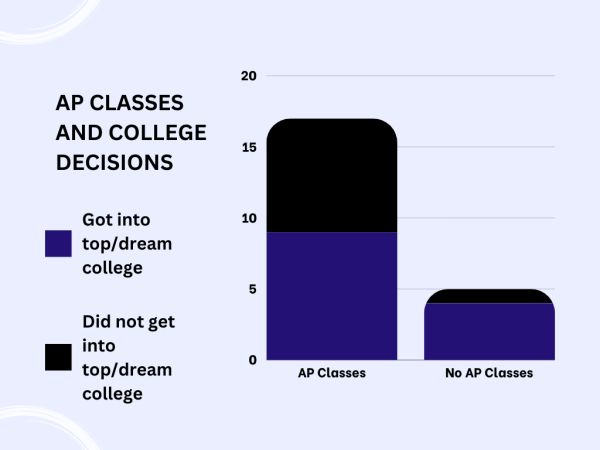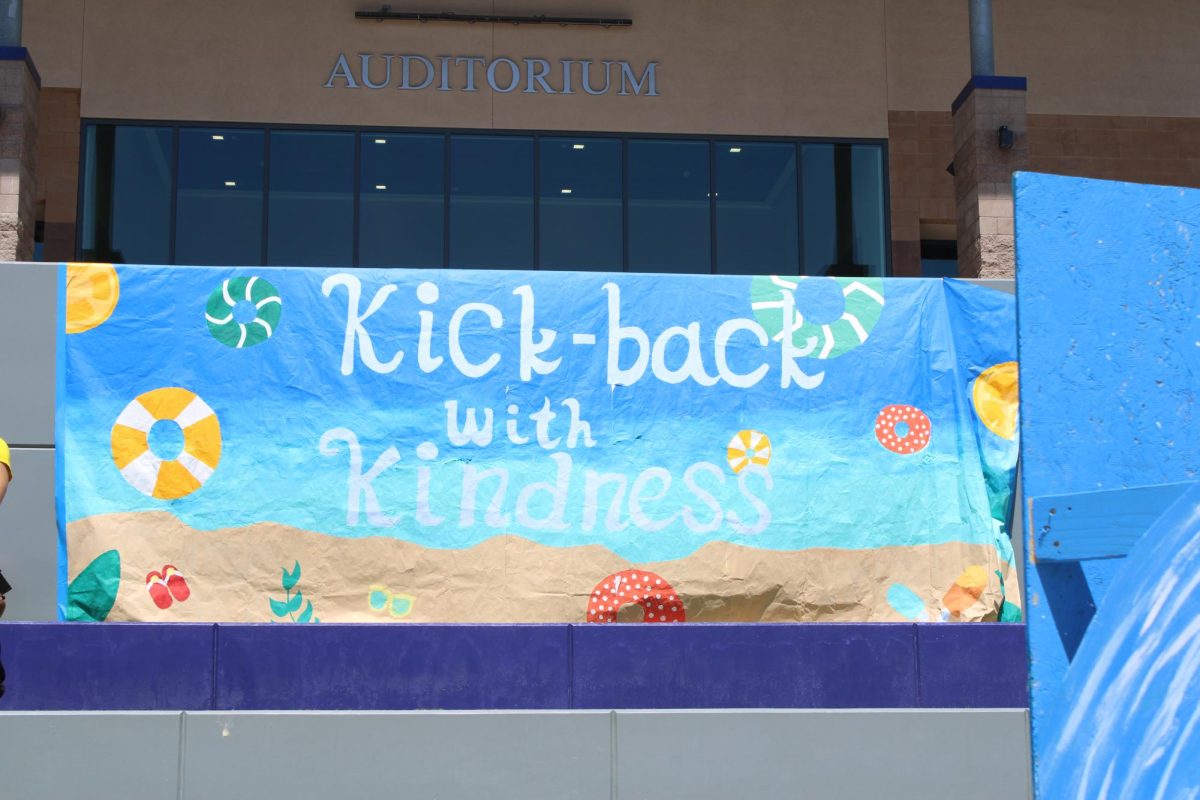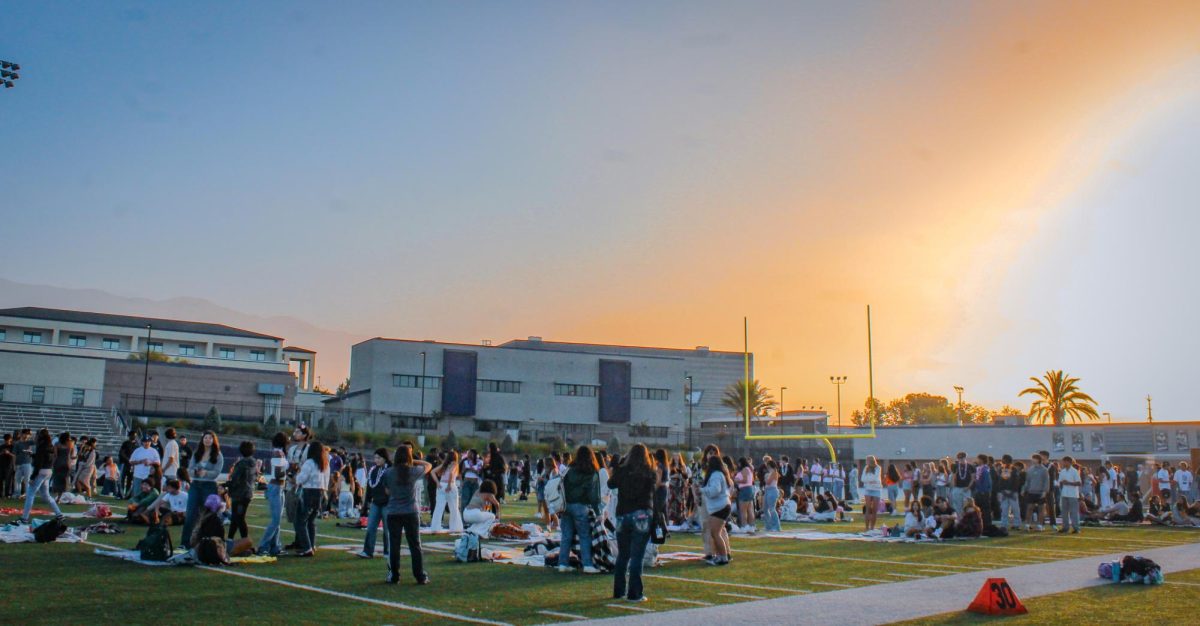Most students wonder whether taking an AP class in high school is beneficial for their college careers. While many people think AP classes look better, there are debates whether it is really worth taking rigorous classes for college admissions.
AP classes are Advanced Placement classes by The College Board. These AP courses are considered to be more rigorous and faster-paced than college-prep courses. In May, AP students take the AP exam for the specific courses they take. The exam scores on a 1-5 scale, with 5 being the highest. With these scores, students can submit their scores of 4 and 5 to colleges for college credit. Some colleges accept a score of 3.
According to Admit Report, AP classes can be seen as a factor in college admissions. However, it is not only the AP courses a student takes that is taken into consideration, but also, academic achievement, extracurricular activities, essays, letters of recommendation, and standardized test scores.

(Melody Su)
With college admissions, according to the Admit Report, the grades of the AP course tend to matter more than the score received on the exam. Colleges like to see students challenge themselves with the curriculum they have at school and often like to see the performance in the class through a long period of time, which is why the grade seems to matter more than the score.
These classes can be seen as useful and beneficial for college though. With these courses being more rigorous and more in-depth than honors and college-prep classes, it allows for those students to already have the work ethic of a college course since an AP class is equivalent to a college course.
“From taking AP classes, I have been given the opportunity to prepare myself for my future endeavors,” senior Rianna Mamun at Rancho Cucamonga High School said. “It allows me to feel some sort of ease about doing well on my future college courses.”
Also, with AP classes, it allows for students to be around and work with like-minded individuals. With the same levels of complex thinking, these students can work with each other enhancing their understanding of the content.
“Although at times it is difficult, with like-minded peers by my side,” Mamun said. “We’re all able to succeed in our classes with teamwork and guidance.”
Cayden Ginting, RCHS alumni and a first-year student at Columbia University took 13 AP classes in high school. Ginting said they were beneficial because the material is somewhat similar. However, the college level is fast-paced and often challenging.
“AP classes provided a foundation to a lot of common subjects that were required in Columbia’s core curriculum like parts of AP Biology and AP Literature,” Ginting said.
Taking these classes throughout high school may help a student’s chances when applying to a highly selective college. When getting accepted into that highly selective college, they may be in a more competitive environment than their high school.
However, some students in college believe that AP classes have little to no effect on their college applications and journeys. Morgan Brito-More, a transfer student at California State University Channel Islands and past homeschooled student, said that she chose to go to community college first instead of going straight to a university. Brito-More said she was accepted into all the schools she applied to, so she wouldn’t go back and take AP classes in high school if she had the opportunity to.
Brito-More also had conversations with her college professors regarding grades and academic success.
“Another aspect is based on conversations I’ve had with my professors,” Brito-More said. “They prefer to see students excel in non-AP classes rather than struggle with AP courses and suffer a GPA decline.”
Brito-More said that she is happy with the choices she made in high school and college in regards to her academic career and she wouldn’t change anything she did.
Some seniors believe that if they took AP classes in high school it would not have benefited them all. And most are happy with their choices of not taking any AP classes.
“I don’t not think I could have benefitted my future from AP classes because half the time the teachers teaching suck,” senior Jade Garcia at Upland High School said. “I’m mentally checked out this year, so I would’ve learned nothing.”
According to a poll from a group of 23 seniors from the Class of 24 at RCHS, 77.3% took AP classes in high school. Of the 23 students, 52.9% of those who took AP classes in high school got into their top/dream colleges.
However, the remaining percentage who did not take AP classes in high school, 80% of those also got into their top/dream colleges without taking any AP classes in high school.
AP classes can be seen as not necessarily needed for college applications and looked upon for decisions, but they can look good because it shows that a student is able to take the rigorous workload. It can also possibly help students prepare them for college a little bit with the type of course work.
Regardless of taking AP classes or not, it can be seen that students can be successful with or without them and happy with their path.









